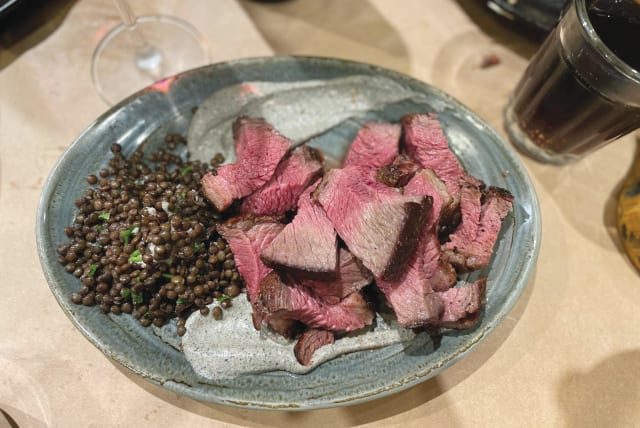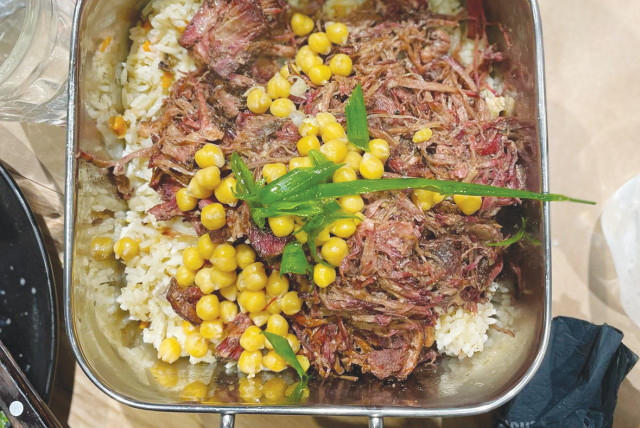Pitmaster: Making magic in Jerusalem - review

At Pitmaster you pay one price, NIS 270, which includes seven meat courses and drinks – as much beer and wine as you want.
I’ve been to Pitmaster twice in the past few weeks, and both times something magical happened.
The first time, I went with my Ladies Who Drink, and I thought the magic might be connected to the copious amount of alcohol we drank. But I went again last week with my family for my youngest son’s 20th birthday (meaning I’m done with teenagers!) and it happened again.
Somehow a whole restaurant becomes united in a special way – eating together, drinking together, and dancing together. There is a DJ, and once the dancing started, there were all-male circles, all-female circles, and mixed circles, dancing to songs likes “Mi She’ma’amin Lo Mefahed.” For the tourists, it was a chance to meet “real” Israelis, although my son describes our family as “Israeli-lite.”
The evening starts with being seated with people you don’t know, kind of like at a wedding. In our case, our tablemates and now friends Tzvi and Malki Jacobowitz were part of a haredi family from Brooklyn.
“This is our small family,” they told me. “We have three older children who are married and have their own kids.”
Their daughter Fraide is here in seminary, and they came to visit. The photos for this article, by the way, are hers.
Their son AJ, a social worker in New York, is 24. My son Netanel, who just finished several months of reserve duty in Gaza, is 23. From what I could hear across the table over the somewhat loud music, they had quite an intense discussion about goals in life. They also had a beer chugging contest, which AJ handily won.
Eating at Pitmaster
At Pitmaster you pay one price, NIS 270, which includes seven meat courses and drinks – as much beer and wine as you want. You can bring soft drinks or other alcoholic drinks, as long as they’re unopened. I am a wine snob and so chose to bring a nice bottle of wine, and Netanel wanted whisky, so we brought that, too.
“The idea is that you don’t have to make any decisions – you just come and have fun,” co-owner Aviad Yitzhaki told me.
There is something freeing about not having to choose anything except your beverage of choice. The Pitmaster decides on the menu, and both times I had a completely different meal.
The Pitmaster was Meir Barel, a chef and rabbi who studied cooking at Le Cordon Bleu, who promised to take the guests on a culinary journey. We started in Italy with a ragu of smoked meat that was delicious. We then moved on to Uzbekistan with ushpelo, a rice and lamb Bukharan dish. My two favorite dishes of the night were the picanha, a popular cut in Brazil that has lately become trendy in Israel, and the slices of sirloin in a Japanese sauce that was one of the last courses we ate.
“Every night we play the song [‘Mishpaha shel Simha’, with the words] ‘ki kulana mishpaha’ [we are all family], and that’s really my motto,” he said. “When I first got to Pitmaster, I thought it might be too materialistic, but I decided to take it to a holy place.”
Rabbi Barel himself was called up to the reserves and spent more than 60 days identifying body parts in the Gaza area. One of the guests the night I attended was a senior general in Gaza.
“Wait,” my son Netanel said after meeting him. “You’re the one who gave us that speech when we left Gaza. But to be honest I wasn’t really listening. I just wanted to get home.”
Now a few words about portions. They are very large. They allocate a kilo of meat per person. While my sons probably ate that much, the rest of us didn’t come close, meaning a lot of food was left on the table. It is served family style, meaning each family at the table gets a central platter, and each person serves themselves from that.
I would have been happy to take home leftovers, and it did bother me to see so much food wasted. Once food has been put on the table, it cannot be reused, even if it hasn’t been put on individual plates. I would suggest having the waitstaff leave a stack of cheap containers on each table so people can pack the leftovers if they choose.
When you reserve online, they ask if you have any special dietary needs or allergies. My daughter is allergic to tomatoes (quite a challenge in Israel). Online, someone asked me if the allergy was life-threatening and said they could not promise there was no cross-contamination in the kitchen. When we were seated, the server already knew about her, and brought her a tomato-free alternative for every course except the tomato-sauce ragu. She said she was very happy about how well she was accommodated.
Somewhere around the fourth course the dancing started. For me, getting a chance to dance with my family was great, and after all of the tension of the past four months, it felt great to just kind of let go.
My haredi tablemates didn’t join the dancing in the middle of the hall, but they did stand up and kind of sway around the table.
They told me they had heard about Pitmaster on Instagram. I think, for American tourists, having an opportunity to meet Israelis who have served or are currently serving in the army is something special. For me, it was an opportunity to talk to haredim, albeit American haredim, which I rarely get to do.
We were all having so much fun that we didn’t want the evening to end, but they had another group coming for the 9 p.m. meal. When we came in, my son had started chatting up a pretty seminary girl and her father, who had come to visit her. When we left, he was making plans to meet up with them in a bar in the shuk. Am Yisrael Chai!
- Pitmaster
- Cinema City Jerusalem
- Reservations: https://ontopo.co.il/en/pitmasterjerusalem
- Hours: Sunday-Wednesday, 8 p.m.; Thursday, 6 p.m. and 9 p.m. Closed Friday and Saturday.
- Kashrut: Harav Mahpoud
The writer was a guest of the restaurant.
Jerusalem Post Store
`; document.getElementById("linkPremium").innerHTML = cont; var divWithLink = document.getElementById("premium-link"); if (divWithLink !== null && divWithLink !== 'undefined') { divWithLink.style.border = "solid 1px #cb0f3e"; divWithLink.style.textAlign = "center"; divWithLink.style.marginBottom = "15px"; divWithLink.style.marginTop = "15px"; divWithLink.style.width = "100%"; divWithLink.style.backgroundColor = "#122952"; divWithLink.style.color = "#ffffff"; divWithLink.style.lineHeight = "1.5"; } } (function (v, i) { });

